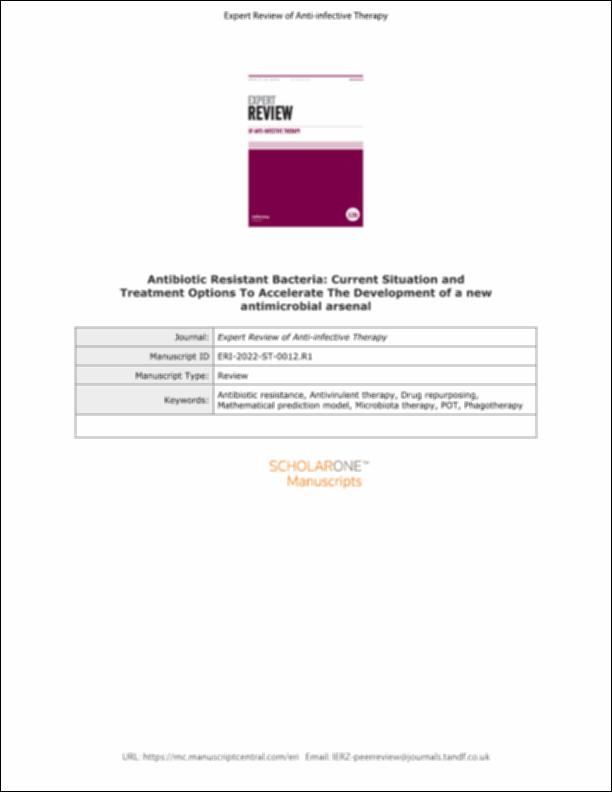Por favor, use este identificador para citar o enlazar este ítem:
http://hdl.handle.net/10637/13970Antibiotic resistant bacteria : current situation and treatment options to accelerate the development of a new antimicrobial arsenal
| Título : | Antibiotic resistant bacteria : current situation and treatment options to accelerate the development of a new antimicrobial arsenal |
| Autor : | Tarín Pelló, Antonio Suay García, Beatriz Pérez Gracia, María Teresa. |
| Materias: | Enfermedades infecciosas - Tratamiento - Modelos matemáticos.; Drug resistance in microorganisms - Mathematical models.; Resistencia a los medicamentos - Modelos matemáticos.; Communicable diseases - Treatment - Mathematical models. |
| Editorial : | Informa UK |
| Citación : | Tarín-Pelló, A., Suay-García, B. & Pérez-Gracia, M. T. (2022). Antibiotic resistant bacteria: current situation and treatment options to accelerate the development of a new antimicrobial arsenal. Expert Review of Anti-infective Therapy, vol. 20, i. 8 (31 may.), pp. 1095–1108. DOI: https://doi.org/10.1080/14787210.2022.2078308 |
| Resumen : | Introduction Antibiotic resistance is one of the biggest public health threats worldwide. Currently, antibiotic-resistant bacteria kill 700,000 people every year. These data represent the near future in which we find ourselves, a "post-antibiotic era" where the identification and development of new treatments are key. This review is focused on the current and emerging antimicrobial therapies which can solve this global threat. Areas covered Through a literature search using databases such as Medline and Web of Science, and search engines such as Google Scholar, different antimicrobial therapies were analyzed, including pathogen-oriented therapy, phagotherapy, microbiota and antivirulent therapy. Additionally, the development pathways of new antibiotics were described, emphasizing on the potential advantages that the combination of a drug repurposing strategy with the application of mathematical prediction models could bring to solve the problem of AMRs. Expert Opinion This review offers several starting points to solve a single problem: reducing the number of AMR. The data suggest that the strategies described could provide many benefits to improve antimicrobial treatments. However, the development of new antimicrobials remains necessary. Drug repurposing, with the application of mathematical prediction models, is considered to be of interest due to its rapid and effective potential to increase the current therapeutic arsenal. |
| Descripción : | Este artículo se encuentra disponible en la siguiente URL: https://www.tandfonline.com/doi/abs/10.1080/14787210.2022.2078308 Este es el postprint del siguiente artículo: Tarín-Pelló, A., Suay-García, B. & Pérez-Gracia, M. T. (2022). Antibiotic resistant bacteria: current situation and treatment options to accelerate the development of a new antimicrobial arsenal. Expert Review of Anti-Infective Therapy, vol. 20, i. 8 (31 may.), pp. 1095?1108, que se ha publicado de forma definitiva en https://doi.org/10.1080/14787210.2022.2078308 This is the peer reviewed version of the following article: Tarín-Pelló, A., Suay-García, B. & Pérez-Gracia, M. T. (2022). Antibiotic resistant bacteria: current situation and treatment options to accelerate the development of a new antimicrobial arsenal. Expert Review of Anti-Infective Therapy, vol. 20, i. 8 (31 may.), pp. 1095?1108, which has been published in final form at https://doi.org/10.1080/14787210.2022.2078308 |
| URI : | http://hdl.handle.net/10637/13970 |
| Derechos: | http://creativecommons.org/licenses/by-nc-nd/4.0/deed.es |
| ISSN : | 1478-7210 1744-8336 (Electrónico) |
| Fecha de publicación : | 31-may-2022 |
| Centro : | Universidad Cardenal Herrera-CEU |
| Aparece en las colecciones: | Dpto. Farmacia |
Los ítems de DSpace están protegidos por copyright, con todos los derechos reservados, a menos que se indique lo contrario.


